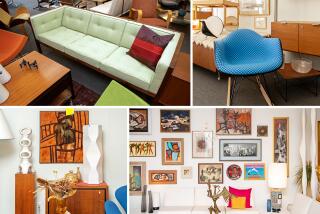Classic Furniture Commands Top Dollar With Pinstripe Set
When insurance agent Don P. Meyer opened his Agoura Hills office a couple of years ago, he spent about $19,000 on handmade Alex Stuart Design furniture--including a massive wooden desk, a credenza, a custom sea chest and three leather wing chairs.
“People like doing business with successful people,” Meyer said. “I want a conservative, professional image. I want respectability.”
Indeed, the furniture made by Chatsworth-based Alex Stuart is reminiscent of the era of patriots in powdered wigs. From the redwood veneer and leather inlays of the company’s Monticello Collection to the hand-carved rosettes of the Century Classic Collection, the furniture proclaims solidity.
“It’s a very traditional, rich executive look,” said Neil A. Silverstein, western manager for Contract Magazine, a New York-based office furniture trade publication. “The look is very heavy and very masculine.”
The people who buy Alex Stuart furniture are the type who feel uncomfortable out of their gray pinstripe suits, said Donald D. McCampbell, president of the 18-year-old company. Most of the desks his company makes end up in banks and law firms, he said.
Furnished Bank Branches
Imperial Bank, based in Inglewood, has Alex Stuart furniture in four of its 13 branches. “The doctors and accountants we want to attract as clients put trust in a place with the classic look,” said William J. Strass, Imperial’s vice president for purchasing.
That look doesn’t come cheap. Alex Stuart’s desks, for instance, retail for $4,000 to $9,000.
Alex Stuart isn’t the only company in the high-end market for office furniture. But most of its competitors come from a century-old tradition of woodworking in Lower Michigan and are in the Grand Rapids area.
In fact, desks and file cabinets made in Grand Rapids account for 35% of the $6.5-billion-a-year office-furniture market in the United States, according to the Business and Institutional Manufacturer’s Assn., a trade group representing 200 makers.
Relatively Small
“It didn’t occur to anyone until we’d been around for a while that quality furniture could come from anywhere but Grand Rapids,” McCampbell said.
Alex Stuart is one of the smaller companies making high-end furniture, with annual sales of less than $10 million a year. Sales and net income for the company have been flat the past two years, McCampbell said.
The company traces its roots to a woodworking shop in Van Nuys called Pacific Sales, which mostly made dining room and coffee tables.
In 1974, Kirsch Co. of Sturgis, Mich., a manufacturer of curtain rods, bought Pacific Sales, moved it to a Chatsworth industrial park and renamed it Alex Stuart. McCampbell was installed as president, and the company moved into the office-furniture market.
Recently Purchased
In December, Alex Stuart was purchased from Kirsch by privately held Myrtle Desk of High Point, N. C., makers of wooden desks that sell for $600 to $4,000. McCampbell said Kirsch sold out because it no longer believed that the furniture company was compatible with its curtain-rod manufacturing operations.
B. F. Hodges, secretary and treasurer of Myrtle Desk, said his company plans no management changes for Alex Stuart and that the companies’ lines fit together well. Alex Stuart hopes to gain more access to East Coast markets through the deal, McCampbell said.
Alex Stuart employs 100 people, most of whom make small wooden parts that are assembled into furniture by a handful of the more experienced workers. The shop resembles a large industrial garage but the pace is slow, and all work is done by hand.
The business manufacturers group says expensive wooden furniture is a growing part of the office-furniture market. Accordingly, industry giant Steelcase, known for its steel-and-Formica desks, last year bought Stow & Davis, a Grand Rapids company that makes high-priced wooden office furniture by hand.
Foreign Customers
Alex Stuart also sells its furniture to interior decorators and office-furniture retailers. Its desks, which weigh more than 450 pounds, have crossed oceans in wooden crates on their way to Saudi Arabia and Indonesia from the Chatsworth facility.
McCampbell said the company’s desks are rarely sold without accompanying pieces.
Credenzas go for $2,500 to $5,200. Swivel leather wing chairs for the desks, as well as guest chairs, sell for $1,700 to $2,000. Leather sofas sell for $3,500 to $5,000.
The company also accepts special orders. Insurance agent Meyer’s desk, with its roped edges and a nautical theme, retails for $5,600.
McCampbell said the furniture costs that much because the manufacturing process is so slow: It often takes several weeks to complete a single piece.
Walnut Inlays
The company’s best seller is called American Classic. Inlaid with walnut, the desk has brass handles on its ends and molding around the edge that McCampbell says is distinctly 18th-Century American. The company’s Armada Collection, with brass tacks lining the desk tops, is designed to reflect early California history.
McCampbell says the business is recession-proof. “Lawyers always do well,” he said. But Lorne Hirsch, president of Olden Tymes in West Los Angeles, a retailer that sells Alex Stuart furniture, said such products are a luxury and executives don’t redecorate in slow economic times.
Trend Toward Modern
Hirsch said office furniture trends swing between contemporary and classical. He said that the trend now is toward the lighter, simpler, more modern styles but that there is a small, constant market for classical styles.
“The best customer for expensive, old-fashioned furniture is always the insecure young attorney,” he said. “They want people to say, ‘Hey, this guy knows what he’s doing,’ right from the starting gate.”
Imperial Bank’s Strass said the furniture gives branches the look of old England. Meyer said he thinks his furniture’s nautical look symbolizes masculinity and success to visitors.
“When I visit my lawyer, I want to think I’m seeing the kind of guy who wins most of the time,” McCampbell said.
More to Read
Inside the business of entertainment
The Wide Shot brings you news, analysis and insights on everything from streaming wars to production — and what it all means for the future.
You may occasionally receive promotional content from the Los Angeles Times.










